Young people’s participation and digitalisation: opening up space for new forms of political participation?
Year of production: 2024

Infographic by Mireille van Bremen
Young people use digital tools not only to stay informed about political, social and economic issues, but also to express themselves, to communicate, to share information, and to find opportunities for education, employment, learning mobility and political participation. Contemporary forms of youth participation, including engagement through the digital realm, may not always be recognised as legitimate, or even as participation, but at the same time they are determined by the permanent change in young people’s needs and interests, and the evolving context.
Digital participation, sometimes called e-participation, can be defined as a postmodern, emergent or future form of participation that takes place online (Forbrig 2005). It involves the use of information and communication technology ( ICT), social media and other digital tools to enable young people to influence and engage with political and civic life (SALTO Participation and Information 2023). On the one hand, digitalisation can be perceived in terms of opening up new opportunities for reaching out to different groups of youth, creating networks and organising large numbers of young people (Șerban et al. 2020). On the other hand, it is important to recognise its weaknesses in creating real impact (often labelled as clicktivism or slacktivism) and the fact that it leaves outside the participation sphere those without access to infrastructure or sufficient digital competences.
This paper aims to discuss young people’s participation in relation to the increased digitalisation of all aspects of life, including participatory processes. It explores the emergence of new forms of youth activism and participation linked with digitalisation as well as the associated challenges. It has to be noted that even though digitalisation is an important phenomenon, which has further accelerated with the Covid-19 pandemic, there is still little in-depth research about the specificities of digital youth participation and digital activism. Very little is known about the specific tools and platforms that stimulate youth political participation.







